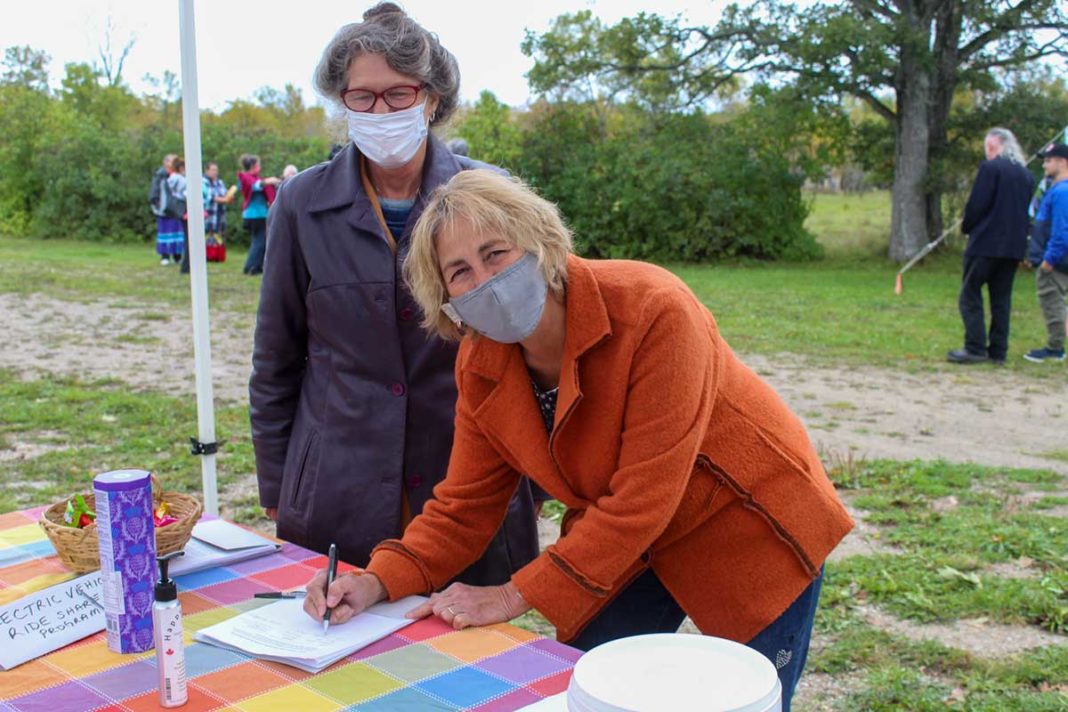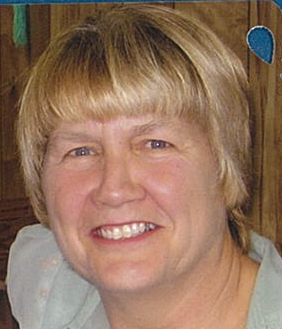KAGAWONG – United Manitoulin Islands Transit (UMIT) is currently circulating a petition to gather support for the development of a ride share system on Manitoulin to support the reduction of carbon emissions on the Island and to mitigate the effects of climate change for future generations.
Algoma-Manitoulin-Kapuskasing MP Carol Hughes dropped by UMIT’s booth at the 2021 Elemental Festival in Kagawong and signed the petition, which will become part of a community support letter attached to an upcoming funding application for the Rural Urban Transit Fund with Infrastructure Canada.
“The fund is specifically for ride shares and implementing innovative technology,” said Kim Neale, currently a volunteer with UMIT in an advisory capacity. This application is for the first phase of the project, a planning grant that includes a feasibility study. “Phase one is to determine what electric vehicle (EV) charging stations we want to buy and what the best locations for them are going to be.”
Two of the four initial EV charging stations will be in Indigenous communities and two will be in non-Indigenous communities. UMIT is moving forward with a ride share pilot project using gas powered vehicles. “We’re going to figure out where we have the most demand,” Ms. Neale said.
The ultimate goal is to install the first four publicly available EV charging stations on the Island so there will always be a charging station that members of the public can pay for. At each of the charging stations there’ll be a designated spot for the ride share vehicles to plug in eventually because each station has two plug-ins. “If it goes well and there’s a lot of demand, we may find we need more EV charging stations, more ride share cars and more drivers.”
“We’re trying to promote ride share on the west side of the Island,” said UMIT Executive Director Johanna Berti. “We’re still looking for drivers to help us run this pilot and show us the feasibility of this as a long-term service. Ride share is not like a taxi. It truly is sharing a ride with other people who are starting at a similar point and going to a similar destination. It’s much cheaper than a taxi.”
They’re hoping the pilot project will demonstrate a sustainable long term future for public transit on the Island. Currently the ride share system is designed to meet up with the existing bus service on the southeastern side of the Island. “A fixed route bus service lacks the flexibility to serve the ridership needs of the travelling public,” Ms. Berti said. Ridership on the bus has been low during COVID but there has been a slow increase since July.
This is something we need to happen now, she said. “This isn’t something we can download to the next council, to the next person who gets voted in. There’s no more time left. We’ve been told since 1968 with Rachel Carson’s ‘Silent Spring’ that this is what we’re heading for.”
“We’ve somehow managed all this time to avoid that it’s had anything to do with us personally,” she continued. What is clear to her now (“just talk to anybody who knows anybody from Lytton, BC”) is that time is over. “When we see 40°C temperatures in Northern Canada anywhere in a dome that doesn’t move for weeks, it’s here. It’s in Canada. It’s now. With a 75 percent increase in forest fires in Northern Ontario just this summer along with wildly varying temperatures throughout, we must undeniably recognize climate change is upon us here on Manitoulin.”
Every car that drives on Island roads emits about four tonnes of greenhouse gases per year. Reducing two car families to one car families could substantially decrease the carbon tonnage the Island emits into the atmosphere on an annual basis, Ms. Berti said. “The differences that we saw in the first three weeks of this pandemic in the first three weeks when everything was locked down and jet planes were grounded, there was a great reduction in traffic emissions other forms of pollutants. It took the environment three weeks to come back to life and show us things we hadn’t seen for decades,” she pointed out. “That is compelling and we could see it in our own skies right over Manitoulin during that period.”
Ms. Berti wants people to realize that while climate change is upon us, so too are the solutions. They don’t necessarily have to be huge changes. “A series of small changes will make a difference because they’ll all add up but we’re coming from a very corporate, ‘bigger is better’ sort of thinking and at this time it’s difficult to see that what we do in our own backyard will add up.”
She acknowledges it is challenging for municipalities, particularly rural ones. The order of decision making for municipalities has been relatively innocuous and many considerations have been social or driven by municipal boundaries. “We need to recognize the Island is one place, regardless of municipal boundaries, and everything that is happening in Ontario is affecting us in ways that we can both see and not see.”
“The human challenge is changing the way we think in order to recognize the problem and then work together to come up with viable solutions,” she continued. “At an international level we don’t do this well. At a national level we don’t do it well. At a local level we’re clearly challenged or we are struggling. The interesting thing to me is we’re living in a time when we have more in common as a species and we have more in common in terms of desired outcome as ever has been true in human history.”
She quotes the recent words of youth climate activist, Greta Thunberg: “Youth are not going to save us and we will not forgive you.” The young scientists of the future are not going to save us, said Ms. Berti. “Let’s stop this fantasy that young people are going to forgive us for being greedy, for seeing the freight train coming and doing nothing to stop the oncoming traffic. If we miss this opportunity now to do something to mitigate the situation, with all of the information we have available to us, there really is nobody to blame but the currently existing population.”
She circles back to climate change in terms of transit. “Half of our emissions come from our vehicles so our reticence to utilize shared or public transit is now coming into sharp focus when we consider a zero emissions future.”





